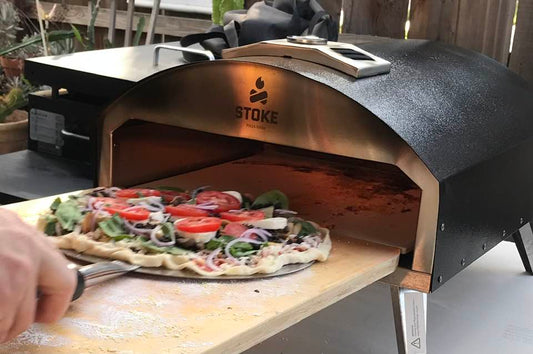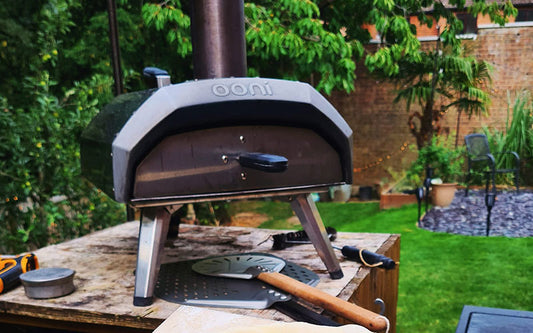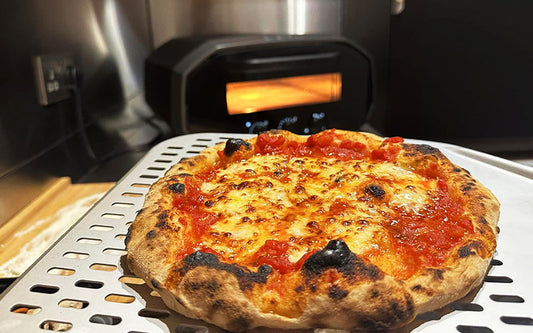Ready to bake with precision? Discover the Best Kitchen Scale for Pizza Dough to ensure perfect measurements. Join us on a culinary journey and elevate your baking game to new heights!
Making pizzas at home or in a professional kitchen can be as simple or elaborate as you want it to be. I mean, the base is just flour, water, and yeast, right? Just get the proportions right and dish out perfect pizzas with every sweep. But how do you get the proportions right each and every time with a mysterious and inevitable phenomenon called “human error” at play?
The answer is fairly simple: get a pizza scale.
A pizza scale is a high-precision kitchen scale that’s armed with the ability to accurately measure your ingredients, especially the delicate dance between flour and water ratios. It also helps you ensure that the correct amount of toppings and cheese are added to pizzas for perfect consistency in taste.
With the help of this tool, you can unlock a level of pitch-perfect dough consistency every single time. If you are new to pizza making from scratch, or wondering how to pick the most accurate pizza scale, keep reading:
🥇Best Kitchen Scale for 2024
- BEST VALUE : [OXO Good Grips Food Scale]
- Editor’s Pick: [Ooni Digital Scales]
- BEST FOR CAPACITY: [Escali Primo Digital Food Scale]
🤔How to Choose the Most Accurate Pizza Scale?
The secret to perfect pizza dough is precise measurements. Yeah, I mean, you can eyeball the ingredients like ancient people used to. But if you want to produce consistent results and avoid wasting ingredients because of a silly human error, just get yourself a pizza scale, alright?
There are two different types of pizza scales available in the market. Digital and mechanical scales. Digital scales are obviously more accurate and easier to use than mechanical scales.
They also have additional features such as tare functions. This cool feature allows you to subtract the weight of the container you’re using so you get the most accurate reading for your ingredients. Here are some qualities to look for when shopping for a pizza scale:
Accuracy
The whole point of buying a scale for pizza dough is accuracy. An inaccurate scale will result in inconsistent dough and toppings. This can affect the quality of your pizza.
So, look for a digital scale with a high level of accuracy, preferably one that can measure in small increments. Ideally, choose a digital scale with 0.1-gram accuracy for optimal accuracy.
Capacity
A quality pizza scale should be able to handle the weight of your ingredients. This includes the weight of the container too. If you are making large pizzas, I’d suggest you go for a scale with a larger platform to fit a standard 12″ pizza.
Commercial scales can weigh anything from 0.5 to 350+ pounds in 0.1-pound increments. Standard-size scales, on the other hand, can weigh approx. 8-14 pounds.
Tare Function
The tare function enables you to subtract the weight of the container you’re using. It gives you the most accurate reading for your ingredients. This is an absolutely essential feature when making pizza dough. Almost every digital kitchen has this function these days. If yours doesn’t, time to get a better one!
External Tare Switch
An external tare switch allows you to tare the scale after adding each topping. Essentially, it provides a convenient means to reset the scale to zero with a single press. This helps streamline your cooking or baking process.
This helps you achieve more consistent pizza orders and a faster, more streamlined pizza assembly process. The switch should be easy to use, preferably one that can be hit with your fist when your hands are messy.
Dual Platforms
Some scales come with dual platforms that let you weigh both wet and dry ingredients at the same time. This feature can save you time and make the pizza-making process more efficient.
Now, okay, ease your eyebrows. I know scales can only measure weight and not volume. Any food scale that claims to “accurately measure liquids” is just kidding with you.
However, there is a workaround. In the metric system, the weight of water is commonly expressed as 1 gram per milliliter (g/mL). So if your dough recipe calls for 100 ml water, you simply tare the weight of the container. Then start pouring the water into it until the scale shows 100g.
But keep in mind that these values are based on the density of water. So to measure the quantity of sauce or olive oil, you will need a liquid measuring cup.
Pull-Out Displays
With a pull-out display, you can read the weight of your ingredients even when using a large container. This feature is especially useful when weighing large amounts of ingredients.
However, if you are a casual user, a bright LCD display with large enough fonts will be good enough.
Waterproof
If you are using your scale in a commercial kitchen, do consider opting for a waterproof scale. This will protect your scale from spills and other accidents that may occur in a busy kitchen.
Timer and Temperature Sensor
Assuming that you’re going to use your kitchen scale for a lot more than just pizza dough, these two features can be helpful in certain situations.
For example, time and temperature-sensitive recipes such as bread making or sous vide cooking would greatly benefit from these functions by helping you minimize clutter on the kitchen counter.
Calorie Counter
Having an undying love for pizza and a slim waist aren’t always mutually inclusive. But what if you could make sure you are staying in a calorie deficit while eating what you love (once in a while)?
This nifty little function will allow you to accurately measure the weight of each ingredient. Plus, you can instantly view the corresponding calorie count. This feature is particularly beneficial for individuals who are following a specific diet plan.
👥Digital or Mechanical? The Right Type of Pizza Scale for Maximum Accuracy
Like all specialized weight equipment, pizza scales also come in two varieties – mechanical and digital. What’s the key difference? Let’s see:
Digital Scales
Digital scales use electronic sensors to measure weight and display the results on a digital screen. They are more precise than mechanical scales. They can measure even the smallest weight increments with accuracy. Moreover, you can change the measuring units from imperial to metric or provide dual readings.
They are designed for accuracy and speed. And the easy-to-read digital displays make it simple to get consistent readings without much effort. Most digital scales can weigh food in 0.1-pound increments. Others display readings in 1-gram or 0.05-ounce increments.
I would recommend digital scales for pizza shops, cafes, bakeries, or places that require consistent, high-volume use.
Mechanical Scales
Mechanical scales are traditional scales armed with a spring and lever to measure weight. They are easy to use and require no power or batteries. When calibrated properly and frequently, mechanical scales can be measured with a precision of ± 0,3 %.
Some mechanical pizza scales also have the tare function. On the downside, these scales are much more prone to user error. Plus, it is often very difficult to read the weight from a sliding arm. Moreover, mechanical scales also have a limited capacity. So, they are not best suited for larger batches of dough.
Final Verdict
In conclusion, irrespective of whether it’s digital or mechanical, the most accurate food scales are the ones that provide readings in the smallest increments. As simple as that.
In most cases, digital scales are more precise and convenient to use than their mechanical counterparts.
⭐Best Kitchen Scale for Baking
1. Ooni Dual Platform Digital Scales
If you’re serious about baking, I highly recommend investing in this scale. It features two platforms – one large and one small. I’m a baker by hobby. So, I end up using the smaller platform more often. It is an absolute marvel for its ability to capture even the tiniest variations—perfect for weighing yeast down to the gram.
The large platform boasts an impressive maximum capacity of 22.04 pounds. So, if you are a home baker determined to focus on consistency, this product is for you.
I also loved the ability to switch from grams and kilograms to ounces and pounds. The display is refreshingly clear, and the tare weight zero buttons add an extra layer of convenience.
Of course, no review is complete without a dose of honesty. The scale does come with a higher price tag. Nevertheless, for the genius dual-platform design and the exceptional accuracy, it’s worth every penny.
2. OXO Good Grips Food Scale
Quite easily the best 11-pound food scale in the market right now. I rely on it daily, from weighing coffee beans to measuring ingredients for my pizza dough. One standout feature for me is its spacious base. It allows for easy weighing even when I’m using large plates or bowls.
Props for the pull-out display as well. Thanks to this, I can easily view the data without any obstruction when using a large bowl. The design is sleek and portable. I dropped it twice, and it’s still working fine. So, I think it can take a good amount of beating.
Coming to the negatives, there have been occasional fluctuations of around +/- 20 grams when measuring anything less than 1-5 grams.
3. Escali Primo Digital Food Scale
This one is not as fancy as the previous two scales but gets the job done without any fuss. Considering its affordable price point, I have to say it’s impressively accurate.
It has multiple unit options, and the zero function is handy for adding ingredients one by one. It’s easy to clean and easy to store due to its ultra-compact design. The tare function works flawlessly, even with heavy bowls.
That said, it has limited weight options. It doesn’t measure in milliliters or provide specific measurements for liquids or milk. If you don’t mind that, I don’t think you can find a better deal.
🛠Calibrating a Pizza Scale – A Brief Overview
Calibrating a food scale is a simple process to ensure an accurate reading.
To calibrate a digital scale, follow these steps:
- Press ON/OFF to turn the scale on, and wait for the scale to read 0.0g.
- Press and hold the MODE key, usually marked as “M”, until the display reads “CAL”.
- Take one more look at the platform to make sure it is totally bare. Press MODE again to confirm the zero point.
- Place the calibration weight on the platform and wait for the scale to stabilize. You should now see the weight of the calibration weight.
- Press MODE again to confirm the calibration weight. The display should show “End” and return to normal weighing mode.
- For a mechanical scale, simply adjust the pointer to “0” using the adjustment dial located on the top of the base unit.
You should calibrate your scales regularly to guarantee precision and reliability. Over time, weighing scales are exposed to wear and tear, which causes inaccurate measurements.
🦠How to Clean and Store a Pizza Scale?
Your pizza scale is bound to get dirty after each use. So it’s important to give it a good cleaning and store it properly to prolong its lifespan. Here’s how you do it:
Cleaning
- Turn off the scale and unplug it if it’s electric.
- Remove any batteries if it’s battery-operated.
- Use a soft, dry cloth to wipe down the scale and remove any loose debris.
- For stubborn stains or residues, use a damp cloth or a small amount of mild detergent.
Note: Do not use soap and water as it can damage the scale’s components
- You can use a soft-bristled brush or a toothbrush to clean hard-to-reach areas.
- Dry the scale thoroughly with a clean, dry cloth.
Also note: Avoid submerging the scale in water. Also, avoid abrasive cleaners as they can damage the scale’s components.
Storage
- Store the scale in a cool, dry place away from direct sunlight and moisture.
- Avoid stacking the scales, even when turned off, as it can engage the load beam and damage the scale.
- Store the scale flat to avoid any damage to the weighing platform
- If you need to store the scale for an extended period, remove the batteries to prevent corrosion.
Remember to follow the manufacturer’s instructions for cleaning and storing your specific kitchen scale. Different types of scales may require different cleaning methods and storage conditions.
In Conclusion
Every serious baker needs to have a precision scale in their kitchen. After all, accuracy is the key element in baking. A good pizza scale will make sure you do not screw up the recipe like a blithering idiot. Was the last line convincing enough, or should I go on?








